More destructive Japanese beetles found in Tri-Cities. WA state to spray some home lawns
Property owners in part of Pasco will be asked for the first time to allow the Washington state Department of Agriculture to spray their property for the larvae of destructive Japanese beetles.
At least four of the beetles have been found in Pasco, raising concerns.
The invasive insect can devastate grape crops, strip roses and other garden plants of their leaves, and damage turf at homes, parks and golf courses.
Some residents in the Lower Yakima Valley — including in Benton County west of Prosser near the Yakima County line and Grandview, Sunnyside, Mabton and Outlook — also will be asked for permission for spraying as they were last year.
“We’re at a critical juncture,” said Tiffany Pahs, the Department of Agricutlure acting entomology branch manager. “If the community comes together now — getting their properties treated and following the quarantine restrictions — we have a real chance at getting rid of this pest.”
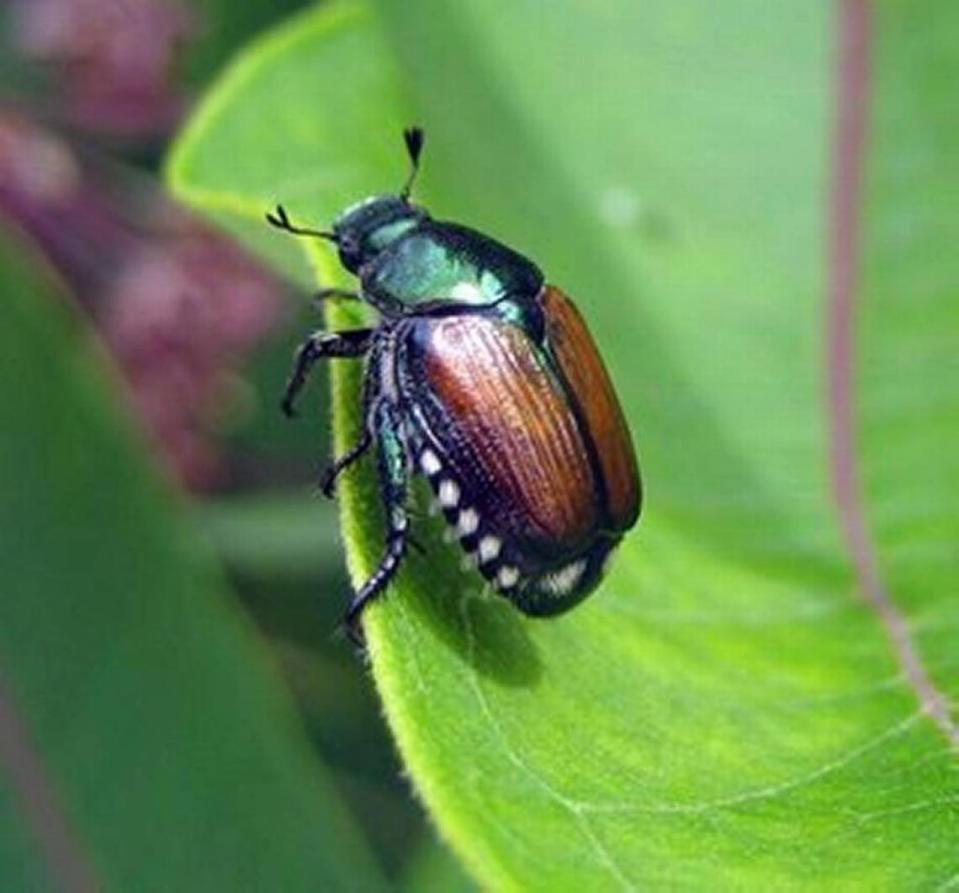
In July, a Japanese beetle was found in a Franklin County Horticultural Pest Control Board trap near Road 76 about a quarter mile south of Argent Road in Pasco.
The Washington state Department of Agriculture responded by putting out 250 traps and beginning inspections of nurseries in the area for possible signs of Japanese beetles.
Since then beetles have been found in other locations.
One was near the U.S. Post Office on Court Street and two more were found at different Henry Street addresses in the Road 36 area.
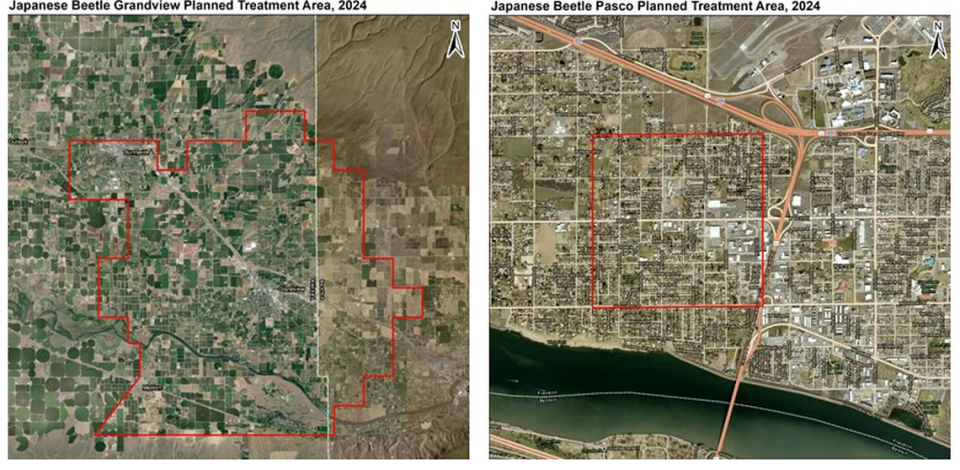
The state would like to spray for the beetles in a square mile from Sylvester Street north to Wernett Street and from near Road 46 east to almost Road 30 where three of the beetles were found.
Letters are being sent to property owners there with permission forms they are asked to fill out. They also can fill out a form online in English or Spanish if they are in the area planned for spraying. Go to bit.ly/JapaneseBeetleForms.
Spraying of the larvicide Acelepryn would be done in the spring to kill larvae in the ground before they emerge.
The Department of Agriculture says the insecticide has a good safety record and is not a health risk for humans, pets, wildlife or beneficial insects such as bees, but that people and pets should avoid the treated area until it dries.
Japanese beetles in Richland, Lower Valley
The first Japanese beetle was found in the Tri-Cities last year in Richland on Truman Avenue near Target. A nursery is nearby and that may be how the beetle was brought into the area.
With no other Japanese beetles found near there, it is no longer an area of concern for the Washington state Department of Agriculture.
The state is trying to prevent a proliferation of Japanese beetles in the Tri-Cities, like the one see in the Grandview area.
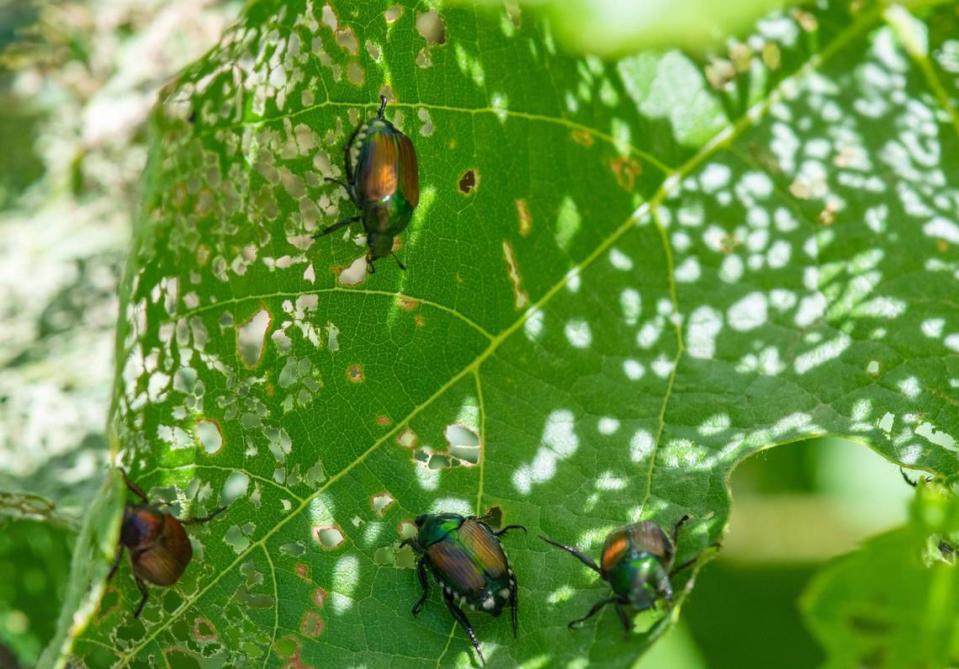
There Washington state is using a quarantine to reduce the worst infestation in the state, which crosses the Yakima County line into western Benton County. Cut flowers, bulbs, potted plants, yard and vegetable garden debris and topsoil cannot be taken out of the quarantine area.
In 2020, three Japanese beetles were discovered there. The next year the state trapped more than 24,000 Japanese beetles. This year the number trapped dropped to just below 20,000.
“We’re starting to see progress from the work we’ve undertaken,” said Camilo Acosta, the state Japanese beetle eradication coordinator, said. “But to really knock back the number of beetles, we need a lot more people to sign up to have their properties treated. We need everyone in the impacted communities to pull together with us to eradicate this beetle.”
About Japanese beetles
The beetles, native to Japan and southeast Asia, are metallic green and brown and have little tufts of white hair on their sides as adults.
They overwinter in lawns or other soil and then emerge in June in the Mid-Columbia to feed on more than 300 ornamental and agriculture plants, turning the plants into skeletons as they consume the foliage, flowers or fruit.
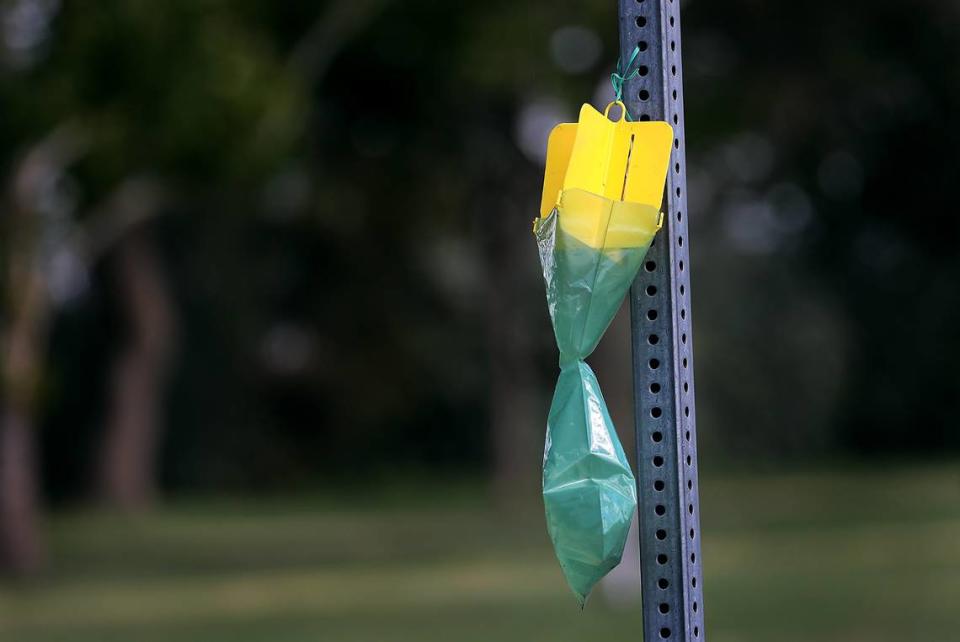
During their grub stage they also can attack grass roots, according to the U.S. Department of Agriculture.
“If Japanese beetles were to become established in Washington, it would pose a serious threat to gardens, parks and farms by destroying vegetation,” according to the state Department of Agriculture.
Farmers could be prohibited from sending agricultural products out of the area.
The state of Oregon has estimated that if Japanese beetles were to become established there, the economic impact to its crops, commodities and other related businesses could be approximately $45.5 million.
Help battle Japanese beetles
A find of Japanese beetles can be reported at bit.ly/ReportBeetlesWA or by email to PestProgram@agr.wa.gov with contact information, the location, date, photographs of the beetles and the number seen.
Or you can call 800-443-6684.
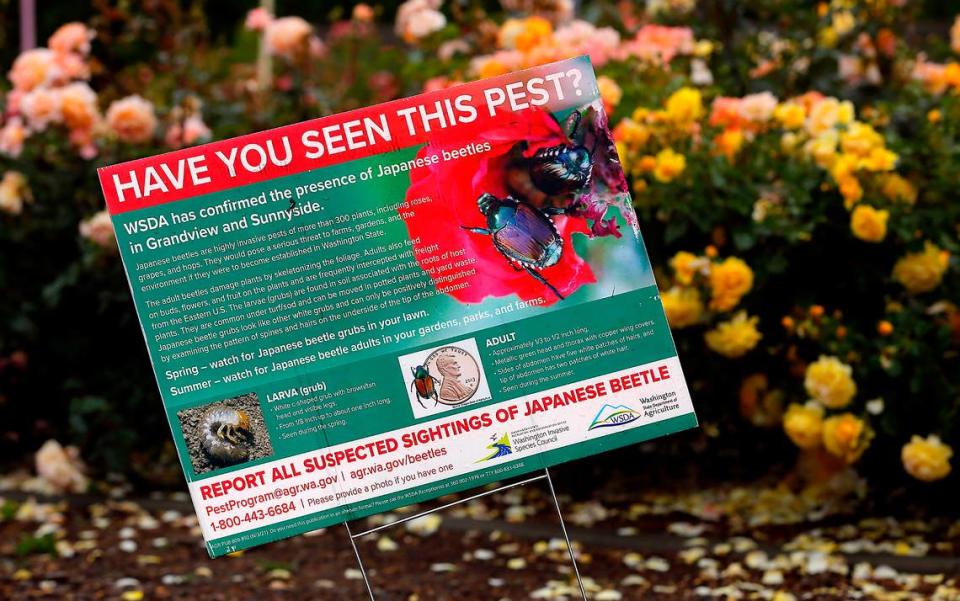
After taking a photo, make sure the beetles are dead before discarding them.
Residents also can help by buying traps sold at home and garden stores and using then on their property from spring through fall, according to the state.
The traps allow any beetles caught to be killed and help the state track the infestation.
Adult beetles can hitchhike on vehicles and on items stored outdoors.
When adult beetles are flying from late spring through October, those who live in or visit the quarantine area in the Lower Yakima Valley should take a second to ensure they are not giving a free ride to beetles when they leave the area.
This can be as simple as checking the back of your pickup truck, according to the Department of Agriculture.

